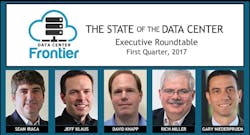Executive Roundtable: How the Cloud is Changing the Data Center Industry
Welcome to our sixth Data Center Executive Roundtable, a quarterly feature showcasing the insights of thought leaders on the state of the data center industry, and where it is headed. In our First Quarter 2017 roundtable, we will examine four topics: How the rise of the cloud is shaping the data center industry, the prospects for additional consolidation and M&A, the latest significant trends in data center tools, and how the focus on speed to market is affecting the data center supply chain.
Here’s a look at our distinguished panel:
- Jeff Klaus is General Manager of Intel Data Center Software Solutions, which provide real-time, server-level data on the power and thermal conditions across a wide range of data center servers.
- Sean Iraca is vice president of service enablement at Digital Realty, the leading provider of wholesale data centers and technology real estate.
- Gary Niederpruem is Vice President, Global Marketing and Strategy for Vertiv, where he is responsible for leading the global marketing effort including devising strategic programs.
- David Knapp is a Product Marketing Manager at Chatsworth Products, a leading manufacturer in voice, data and security products and technology service solutions.
The conversation is moderated by Rich Miller, the founder and editor of Data Center Frontier. Each day this week we will present a Q&A with these executives on one of our key topics. We begin our discussion by asking our panel to predict the data center stories that will matter in the year ahead.
Data Center Frontier: Discussion of industry trends is dominated by the rise of the cloud computing model. How has this cloud-driven disruption impacted the broader data center industry? What are the pros and cons?
DAVID KNAPP of Chatsworth Products
David Knapp: The main impact is that there are fewer organizations building and operating data centers. Cloud providers build data centers, and they lease wholesale space from multi-tenant data center operators. Unlike service providers, they can site their facilities to maximize benefits from weather conditions for “free cooling” to access the lowest cost of electricity and real estate. Additionally, they have demonstrated that a large-scale campus approach works, and some have built on-site clean power generation demonstrating that a commercial data center can provide a portion of the power that it consumes.
The upside: Cloud providers have developed highly efficient data center, white space and compute designs, rethinking both the facility and the equipment. They challenge internal teams to optimize and have created forums to share, test and document best practices. Everything cloud must scale quickly. I think the pro is that they are challenging the industry to find solutions to match this new paradigm. As a result, everybody is innovating.
The downside: Unforeseen and unintentional consequences from putting all the eggs in one basket. Of course, this is not literally the case, but software, compute and network are inextricable. Cloud depends on reliable networks to reach other IT services and network users, and a single outage can affect many individuals and organizations. With a few exceptions: so far, so good. However, there are still 1.5 billion or so folks that would like to be connected to the Internet, and more IoT devices are anticipated than anyone can actually count. Will this model continue to be the most efficient way to reach and support all of these projected users and devices?
Similarly, we are collecting and creating data at an astonishing rate, but it may still be unclear where the data is—who decides what should get stored, how it will be stored, how it will be used and who actually owns it.
GARY NIEDERPRUEM of Vertiv
Gary Niederpruem: The rise of the cloud is real, and while there is a general “cloud computing model,” I’d caution against thinking about it in a static, cookie-cutter fashion. The reality is no two cloud providers are operating the same way. Each one has different applications, different infrastructure architectures and different needs. That’s driving innovation across the industry, and we’re seeing that cloud facilities have become the breeding ground for new data center technologies and designs.
Increased cloud adoption is having an undeniable impact on traditional enterprise data centers, but it’s far too early to sound the death knell. There still is a tremendous amount of investment going into the enterprise segment, but certainly the growth rate of cloud computing is much more robust. That’s not to say private networks are a thing of the past; quite the contrary. But company-owned computing looks different in a cloud-dominated world. Hybrid cloud architectures that leverage private and public cloud resources are increasingly common. And more and more businesses are deploying distributed networks that localize computing at remote sites while maintaining some organization-wide resources in the cloud. This edge computing phenomenon is really just getting started.
Even private, centralized data center facilities are evolving and illustrating the influence of the cloud. The cloud model offered faster access to computing capacity, scalable capacity and reduced capital costs, so data center design had to change to keep pace. We’re seeing more and more prefabricated facilities, deployed significantly faster and more economically, and scaled to meet immediate needs while delivering easy scalability. This is in direct response to the advent of cloud and colocation providers.
The bottom line is simple: Businesses will choose computing solutions that deliver reliability, security, modularity and speed. The model – cloud, colo, enterprise or something else – depends on the unique needs of that company and its customers.
JEFF KLAUS of Intel
Jeff Klaus: Cloud-driven disruption has been profound. The biggest changes we’ve seen are in how and when people need physical infrastructure, understanding how to leverage scale-out virtualization, and facilitating the area of practice known as DevOps.
As this strategy has matured, utilizing the cloud has also moved from a binary decision (between virtual or physical infrastructure) to be one of the complementary elements an enterprise includes in their overall strategy.
SEAN IRACA, Digital Realty
Sean Iraca: The majority of enterprise companies are in some stage of developing or implementing a cloud strategy, and more often than not it is a multi-cloud strategy.
That said, enterprises are also finding that migrating to the public cloud can be challenging. Issues arise around legacy applications that are not directly portable, and there are still data privacy, security and control concerns.
As a result, the majority of enterprises are adopting a hybrid IT model and/or private cloud strategy which bodes well for the colocation industry.
NEXT: Will the M&A action continue? How is consolidation changing the industry?
Keep pace with the fact-moving world of data centers and cloud computing by following us on Twitter and Facebook, connecting with me on LinkedIn, and signing up for our weekly newspaper using the form below:
About the Author


